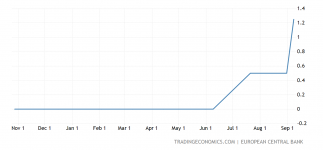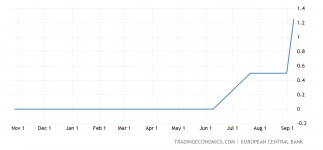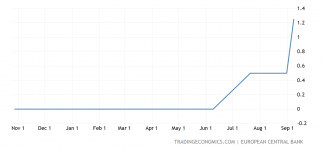Your interest rate is nothing to do with your assets, it is to do with the Eurozone being healthier as a whole than the likes of France and Italy in isolation. You are being subsidised by others. People lend to ECB, ECB lends to your. But the ECB is shutting that down lately. Hence your rates will rise.
See, even Italy is on the same BS rate as you, Germany too and Spain, Greece, Portugal..... EU rate, nothing to do with your asset wealth.
 tradingeconomics.com
tradingeconomics.com

 tradingeconomics.com
tradingeconomics.com

 tradingeconomics.com
tradingeconomics.com

See, even Italy is on the same BS rate as you, Germany too and Spain, Greece, Portugal..... EU rate, nothing to do with your asset wealth.
Italy Interest Rate
The benchmark interest rate in Italy was last recorded at 4.50 percent. This page provides - Italy Interest Rate - actual values, historical data, forecast, chart, statistics, economic calendar and news.

France Interest Rate
The benchmark interest rate in France was last recorded at 4.50 percent. This page provides - France Interest Rate - actual values, historical data, forecast, chart, statistics, economic calendar and news.

Germany Interest Rate
The benchmark interest rate in Germany was last recorded at 4.50 percent. This page provides - Germany Interest Rate - actual values, historical data, forecast, chart, statistics, economic calendar and news.

Expenses are government expenditure, which was included.If I were to do such a calculation, I would be careful not to mix sources and forget expenses. But I don't want to, there are specialists for that.
Last edited:


 If you add up our monthlies and subtract expenditure, our numbers balance, yours do not. #EU Blackhole
If you add up our monthlies and subtract expenditure, our numbers balance, yours do not. #EU Blackhole







